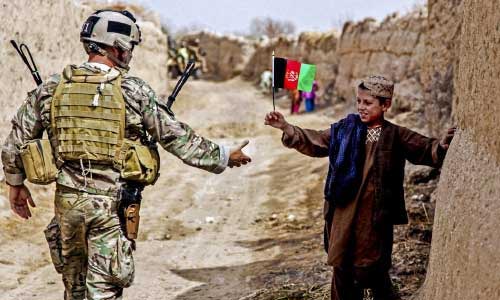One of the main questions which were repeatedly debated in last two decades was whether the war in Afghanistan is religious or political? According to Afghan people, Afghan government and Afghan political community, the International community are present in the country on the basis of mutual interests and strategic agreement between the Afghan government and international forces led-by- the US. In 2014, the Loy-Girga of Afghanistan had unanimously voted for the presence of US and asked the Afghan government to sign the strategic agreement. Despite the more or less differences between the international community and Afghan government policies in last two decades, the presence of international were based a clear legal document which is credible in norm of international relations. Given the recent political history, if the international community had not supported the Afghan government, no one knows what would have happened in the country up to the date. Therefore, there is a clear difference between the current presence of international community and the aggression of Soviet Union in 1979.
Nevertheless, Taliban has repeatedly illegalized the US presence. In justifying the conflict, Taliban has always used religious concepts, mottos and symbols such as Mujahideen, Islamic system, martyrdom and jihad. They attributed the main cause of the conflict to “foreign aggression and interference”. In explaining the reason of ongoing conflict, sometimes they used mix of political and religious reasons. Therefore, for the Taliban, “occupation of Afghanistan” is the political cause of the war and the fall of an “Islamic system” is the religious cause of the war.
They fought against the international forces because they were infidel and occupied the country, but they fought against the Afghan government forces because they indirectly paved the ground for occupation of the country serving the infidels. Hence, the Taliban repeatedly termed it as a "puppet government."
Despite this, there was no harmonization between the Afghan religious scholar community and Taliban position about ongoing war. In May 2018, a large group of religious scholars from Afghanistan, Indonesia and Pakistan gathered in Jakarta to discuss the roots and reasons of the ongoing war in Afghanistan and find a durable peace solution for the conflicts of war-torn country. After long discussions, the Islamic scholars of three countries had issued a joint declaration on the war and peace in Afghanistan, in which they promulgated their opposition against the terrorism and extremism and ending war in Afghanistan. They stressed that that war and violence have no place in Islam and that Islam is the religion of peace and true believers should put into practice what this religion has said. They appreciate the regional countries, Muslim nations and the international community's support to the Afghan peace process.
About one month later, In June 2018, more than 2,000 Afghan religious scholars gathered in Kabul to examine the status of ongoing war in Afghanistan from Islamic viewpoint. After long discussions they issued a collective fatwa outlawing the current war in the country as illegal and irreligious war. They scholars stressed that “war in its all types is forbidden under the Islamic law and it is nothing except shedding the blood of Muslims whereas the real victims are innocent Afghan men, women, and children. In addition, the top religious officials from Saudi Arabia, Imam of Haramain-e Sharifain-in-Macca, prohibited the war in Afghanistan. Unfortunately, these efforts have either been ignored or responded with weapons. As a result, dozens of religious scholars who raised their voices against war and violence had been killed or assassinated in the country.
Now that the Taliban and the US has signed peace agreement and the foreign forces are going to leave the country without war, the religious justification of war has been automatically abolished. However, it seems that the Taliban has also accepted a relative presence of foreigners in the country. According to a report which was quoted from New York Times, the US will maintain seven bases in Afghanistan. These bases are in Herat Province, Mazar-a-Sharif, Bagram, Jalalabad, Kabul (both the airport and the main American base next to the embassy) and Kandahar Airfield in the south. Despite this, the Taliban announced to resume its military operations against the Afghan National Security and Defense Forces (ANDSF). According to the Afghan Ministry of Interior reported yesterday, there were 33 attacks by the Taliban and at least six civilians were killed in a single day.
The Taliban’s moves which is overtly in paradox to their Jehad ideology, has been widely faced with criticism in national and international level. In national level, yesterday, a group of religious scholars condemned killings of security forces and civilians saying there is no more justification for Taliban to continue war against Afghan Muslim people. Meanwhile, Afghan president Ashraf Ghani also criticized the Taliban for continuing attacks on the Afghan security forces, saying there is no space for the Taliban to fight while they have agreed to make peace with foreigners.“They accepted to make peace with the foreigners, then what is the meaning of jihad?” asked Ghani, adding: “The killing of Afghans is a crime.” Ordinary Afghans have also questioned the Taliban’s decision to continue fighting the Afghan security forces under the name of "jihad."
In international level, Roland Kobia, EU Special Envoy for Afghanistan, also said that the Taliban’s announcement for the resumption of violence is against the spirit of the peace deal signed between the United States and the Taliban in Doha. The United Nations Assistance Mission in Afghanistan (UNAMA) called Taliban to respect the violence reduction plan to help build an environment favorable for the start of intra-Afghan talks. Also, Gen. Scott Miller, commander of the US and NATO forces in Afghanistan, said the US-Taliban agreement is a potentially historic agreement for the Afghan people and that “it is fragile if the Taliban are not going to lower violence” and “that causes a risk to the agreement.”

